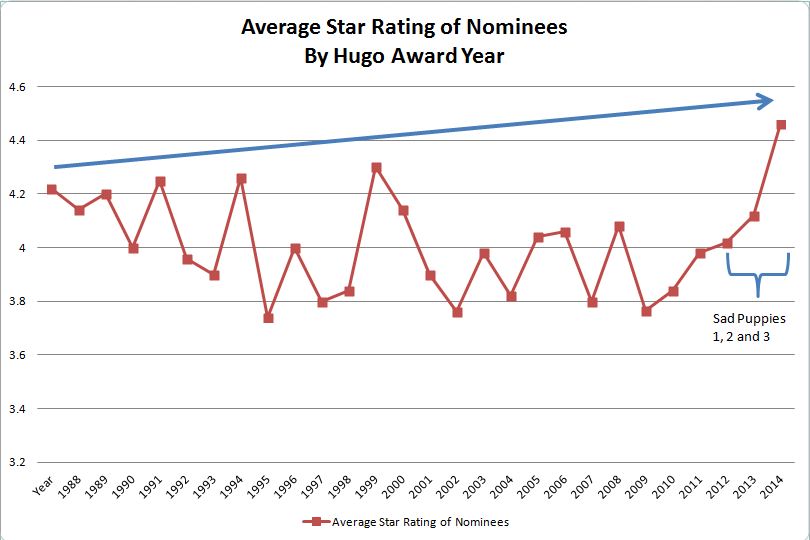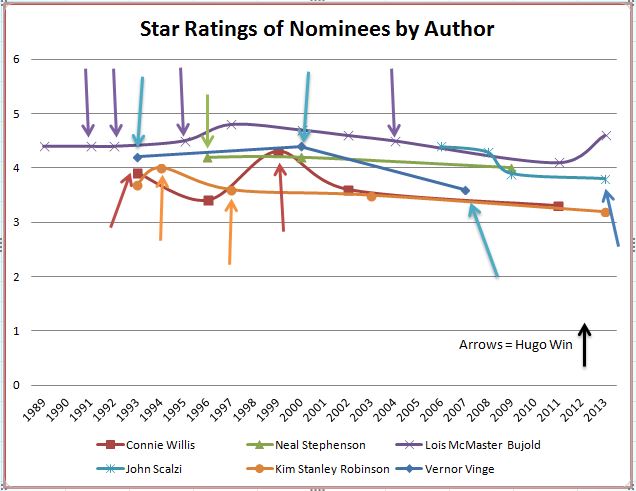In a somewhat quiet year for the Hugo Awards, a number of records have been smashed:
- Most Ballots Cast, Ever: 2,122
- Most nominations for a single individual in a single year (John C. Wright): 6
- First year since the class of 1988 that every Best Novel nominee carries a minimum of a 4-star rating.
- Highest average Amazon star rating since at least 1988 (the earliest year I researched): a whopping 4.46
- Highest number of first-time nominees (in Best Novel) since at least 1988: 4
Some other stats of interest:
And, for fun, the current star ratings of a limited selection of some of the repeat Hugo Best Novel nominees since 1988, with nominated years indicated by markers and wins marked by arrows:
The upshot? Don’t mess with Vernor Vinge. He doesn’t show up on the ballot as often as some, but when he does, he wins!
I really like Lois Bujold’s works: the Miles Vorkosigan series.
Those also seem to be consistently good (with only a few exceptions). The humor, snarkiness, and winning by trickery and being clever all while running the razor’s edge of failing makes for some solid reads. I’ll note: when that razor cuts, it cuts SHARP.
-
My thoughts exactly. Those are one of the SF book series I would recommend the most easily.
Interestingly, it’s one of the few series I know of where, when the razor cuts as you say, the scars won’t go away – status quo be damned.Tangential to the previous article, the Vorkosigan series is also an example of how soft SF isn’t necessarily less worthwhile than harder SF. Sure, they have stuff like plasma weapons and causal artificial gravity, so what? As long as it’s consistent, it doesn’t hinder it being great stories.
(And I do prefer hard SF as a matter of taste.)
Dan, Can you please e-mail me the data you used? Thanks.
Nicely done. Thanks.
Wow. Aside from the outlying data point in 1999 and the upward slope in the past three to four years, that’s one heck of a downward trend. Looks like the average hovered around the 3.9 rating mark, too.
Compared to the epitome of fantasy works (Lord of The Rings, or The Hobbit), that’s almost a whole rating point lower (4.7 and 4.8 respectively).
On a typical five-point rating scale, the numbers usually represent some form of the following subjective measures:
1=Poor, 2=Fair, 3=Satisfactory, 4=Good, 5=Excellent.
In other words, most people say that Tolkien’s work isn’t merely “Good,” but “Excellent.”
What this tells me about the Hugo nominees in general for the past 25 years is that most people merely find them to be “Good.” They barely achieve or barely surpass the “Good” rating.
If the data is accurate, I’m not so convinced that merely “Good” works can be passed off as the “Best” that SF&F has to offer as the Hugo Award seems to claim. It seems to me that, according to this data, Hugo nominees are the embodiment of the tired old phrase, “It’s good, but it’s not great.”
If we didn’t know what “Great” was, how would we possibly know there’s a difference between something good and something great? If the Hugo Award wants to back up its claim, its going to have to start nominating “Great” or “Excellent” works. Because for the past 25 years, it looks like it’s been settling for “just good enough.”
Yes, but do note that Bujold has a 4.7 and 4.8 nominee in the mid-1990s. It is just that her 4.8 (Memory) lost the Hugo to the considerably poorer Kim Stanley Robinson Blue Mars which was a 3.6, 1.2 stars worse. You will note in the last chart that the year she lost to Vernor Vinge, his book rates at 4.4, while hers was 4.7.
So, there are times when (by your definition) “great” books make the list but don’t take home the award. There are also entire years that rank below the lowest-rated book of other years. For example, 2011’s highest rated book is 4.1. This year’s lowest rated book is 4.2. It is quite safe to say that based on that quality metric, 2015 is superior to 2011.
I believe “Blue Mars” was one of the last SF books I read before I gave up on he genre. Gaack.
At least until recently. Thanks guys!

